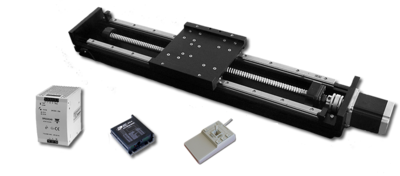Difference between revisions of "How to choose servo motors and drives"
From Granite Devices Knowledge Wiki
| [checked revision] | [checked revision] |
(→Choosing linear guides) |
(→Choosing linear guides) |
||
| Line 20: | Line 20: | ||
| Track linear guide || Medium/high || High || High (Supported from whole length) || Medium | | Track linear guide || Medium/high || High || High (Supported from whole length) || Medium | ||
|- | |- | ||
| − | | Dovetail || Low/medium || Medium/high|| High || Low | + | | Dovetail || Low/medium || Medium/high|| Medium/High || Low |
|- | |- | ||
| Roller || Low/medium || Medium || Medium || High | | Roller || Low/medium || Medium || Medium || High | ||
Revision as of 13:13, 12 March 2014
Choosing suitable servo components for a linear motion machine is straightforward process. This article gives a method for choosing suitable servo motors and drives for a machine with linear axis, such as CNC, 3D printing or pick'n'place systems.
Contents
Defining goals
The first step is to define goals of the system. Find numbers to the following questions:
- How much is the required linear force?
- How much is the maximum desired speed?
- What is the required accuracy (resolution, precision, repeatability)?
- What is the required stiffness / nature of mechanical load (stationary/vibrating)?
Choosing electromechanical parts
Choosing linear guides
Selection of linear guides have different choices to match desired speed range, stiffness, precision and cost. The following table summarizes most common choices with pros and cons:
| Type | Cost | Precision | Stiffness | Speed capability |
|---|---|---|---|---|
| Round linear bearing (sliding) | Low | Low | Low/moderate | Medium/high |
| Round linear bearing (ball) | Low/medium | Medium | Medium (Supported only at end points) | Medium |
| Track linear guide | Medium/high | High | High (Supported from whole length) | Medium |
| Dovetail | Low/medium | Medium/high | Medium/High | Low |
| Roller | Low/medium | Medium | Medium | High |
